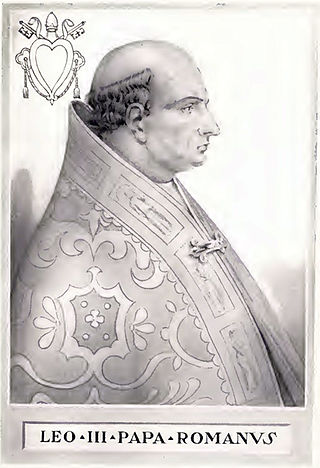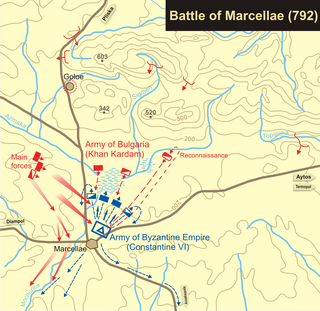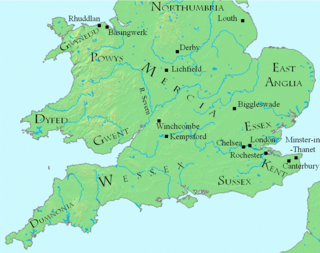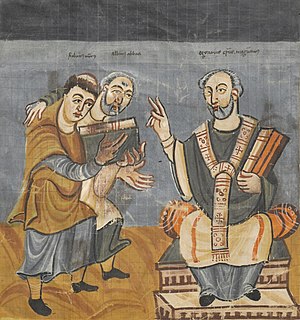The 800s decade ran from January 1, 800, to December 31, 809.
The 790s decade ran from January 1, 790, to December 31, 799.
The 780s decade ran from January 1, 780, to December 31, 789.
The 770s decade ran from January 1, 770, to December 31, 779.

Year 710 (DCCX) was a common year starting on Wednesday of the Julian calendar. The denomination 710 for this year has been used since the early medieval period, when the Anno Domini calendar era became the prevalent method in Europe for naming years.

Year 795 (DCCXCV) was a common year starting on Thursday of the Julian calendar. The denomination 795 for this year has been used since the early medieval period, when the Anno Domini calendar era became the prevalent method in Europe for naming years.

Year 802 (DCCCII) was a common year starting on Saturday of the Julian calendar, the 802nd year of the Common Era (CE) and Anno Domini (AD) designations, the 802nd year of the 1st millennium, the 2nd year of the 9th century, and the 3rd year of the 800s decade.

Year 775 (DCCLXXV) was a common year starting on Sunday of the Julian calendar. The denomination 775 for this year has been used since the early medieval period, when the Anno Domini calendar era became the prevalent method in Europe for naming years.

Year 776 (DCCLXXVI) was a leap year starting on Monday of the Julian calendar. The denomination 776 for this year has been used since the early medieval period, when the Anno Domini calendar era became the prevalent method in Europe for naming years.

Year 777 (DCCLXXVII) was a common year starting on Wednesday of the Julian calendar, the 777th year of the Common Era (CE) and Anno Domini (AD) designations, the 777th year of the 1st millennium, the 77th year of the 8th century, and the 8th year of the 770s decade. The denomination 777 for this year has been used since the early medieval period, when the Anno Domini calendar era became the prevalent method in Europe for naming years.

Year 778 (DCCLXXVIII) was a common year starting on Thursday of the Julian calendar, the 778th year of the Common Era (CE) and Anno Domini (AD) designations, the 778th year of the 1st millennium, the 78th year of the 8th century, and the 9th year of the 770s decade. The denomination 778 for this year has been used since the early medieval period, when the Anno Domini calendar era became the prevalent method in Europe for naming years.

Year 779 (DCCLXXIX) was a common year starting on Friday of the Julian calendar. The denomination 779 for this year has been used since the early medieval period, when the Anno Domini calendar era became the prevalent method in Europe for naming years.

Year 780 (DCCLXXX) was a leap year starting on Saturday of the Julian calendar, the 780th year of the Common Era (CE) and Anno Domini (AD) designations, the 780th year of the 1st millennium, the 80th year of the 8th century, and the 1st year of the 780s decade. The denomination 780 for this year has been used since the early medieval period, when the Anno Domini calendar era became the prevalent method in Europe for naming years.

Year 783 (DCCLXXXIII) was a common year starting on Wednesday of the Julian calendar. The denomination 783 for this year has been used since the early medieval period, when the Anno Domini calendar era became the prevalent method in Europe for naming years.

Year 784 (DCCLXXXIV) was a leap year starting on Thursday of the Julian calendar, the 784th year of the Common Era (CE) and Anno Domini (AD) designations, the 784th year of the 1st millennium, the 84th year of the 8th century, and the 5th year of the 780s decade. The denomination 784 for this year has been used since the early medieval period, when the Anno Domini calendar era became the prevalent method in Europe for naming years.

Year 785 (DCCLXXXV) was a common year starting on Saturday of the Julian calendar. The article denomination 785 for this year has been used since the early medieval period, when the Anno Domini calendar era became the prevalent method in Europe for naming years. It is still used today in this manner.

Year 791 (DCCXCI) was a common year starting on Saturday of the Julian calendar. The denomination 791 for this year has been used since the early medieval period, when the Anno Domini calendar era became the prevalent method in Europe for naming years.

Year 792 (DCCXCII) was a leap year starting on Sunday of the Julian calendar, the 792nd year of the Common Era (CE) and Anno Domini (AD) designations, the 792nd year of the 1st millennium, the 92nd year of the 8th century, and the 3rd year of the 790s decade. The denomination 792 for this year has been used since the early medieval period, when the Anno Domini calendar era became the prevalent method in Europe for naming years.

Year 797 (DCCXCVII) was a common year starting on Sunday of the Julian calendar. The denomination 797 for this year has been used since the early medieval period, when the Anno Domini calendar era became the prevalent method in Europe for naming years.

Year 798 (DCCXCVIII) was a common year starting on Monday of the Julian calendar, the 798th year of the Common Era (CE) and Anno Domini (AD) designations, the 798th year of the 1st millennium, the 98th year of the 8th century, and the 9th year of the 790s decade. The denomination 798 for this year has been used since the early medieval period, when the Anno Domini calendar era became the prevalent method in Europe for naming years.















